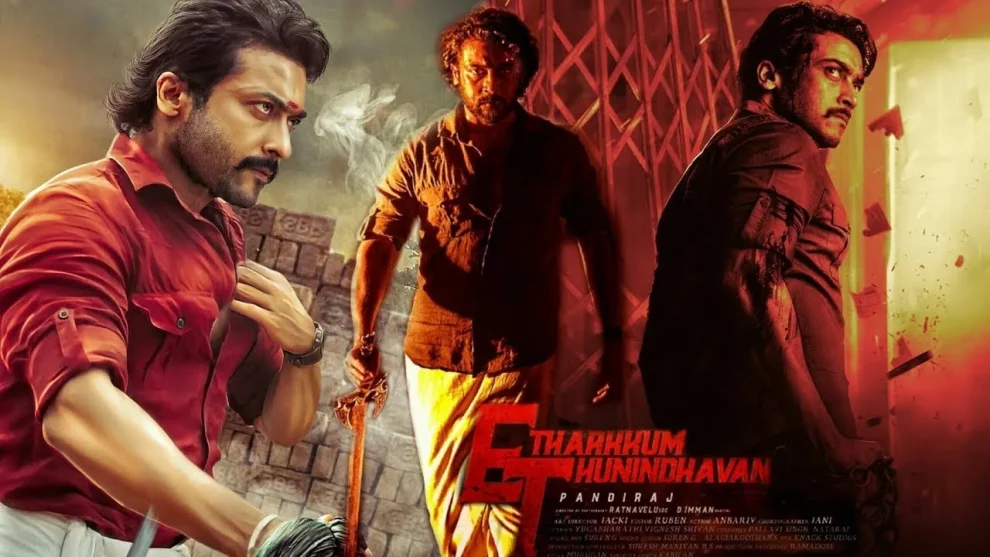Released in theaters worldwide on March 10, 2022, along with dubbed versions in Hindi, Telugu, Malayalam and Kannada languages, “Etharkkum Thunindhavan” was a box office success that now finds its way into Netflix. Despite including a number of Masala elements, the movie also strays away from the norm through a number of interesting elements not all of which work, however. Let us take things from the beginning though.
The story starts in a rather violent fashion, essentially highlighting what will come eventually, but soon moves backwards in time, in order to present the background events that led to the killings. In that fashion, we are introduced to Kannabiran, a lawyer at the Chennai High Court, who lives with his family consisting of his father Aadhirayar and mother Kosalai, in Thennaadu. His father retains a detached but fair relationship with him, but his mother is rather close, to the point that he could be called a ‘mama's boy' despite the fact that he is rather strong and successful (in distinct masala style). Their neighboring village is Vadanaadu. Residents of both villages believe that god and goddess Shiva and Shakti originated in these villages and hold a grand festival celebrating their togetherness. Women in Thennaadu are married to men in Vadanaadu and vice-versa. However, when a woman from Thennaadu, who is married to a man from Vadanaadu, commits suicide, both the villages engage in rivalry.
Ignoring the conflict, Kannabiran falls in love with Aadhini from Vadanaadu and the two of them get married, despite the protests of Aadhini's father and a rather tumultuous ceremony that enervates him even more. Meanwhile, Inba, a central minister's son and his gang exploit unsuspecting woman, whom they woe with promises of love, only to film them in sexually compromising positions and then use the videos to blackmail them. When Yazh, Aadhini's friend, falls victim to their ways, Kannabiran comes to her rescue, which brings him, inevitably, against Inba. Their fight eventually reaches the court, but justice is not exactly served.
As usually in masala films, Pandiraj tries to include as many crowd-pleasing elements as possible. In that fashion, Kannabiran is definitely a larger-than-life character, being all-powerful, rather good looking, very smart and educated, not to mention an ideal son and a protector of the innocent. Furthermore, the occasionally brutal action is only one part of the narrative, as Pandiraj has also included much comedy, particularly through the relationships of Kannabiran and Aadhini with their mothers, melodrama, romance, thriller elements, courtroom drama, and even some documentary-like elements deriving from the presentation of the festival and marriage. The bulk of all these elements results in a number of great individual scenes, which also highlight the excellent cinematography by R. Rathnavelu, which follows noir paths in the night/violent scenes and more bright and polished ones during the day/calm ones, and Ruben's editing, which places the flashbacks ideally to retain interest, while keeping a very fitting, rather fast pace throughout the movie.
At the same time, however, as a whole, the story and the overall narrative do not make fully sense, with the different elements being rather disconnected from each, the plot holes being many, and the reasoning of both the peripheral characters and of a number of events being particularly thin. Essentially, the majority of the movie seems as an “excuse” for Pandiraj to present the aforementioned, crowd-pleasing elements, along with his comments. Add to all that the inevitable music video dancing and singing scenes that extend the duration of the movie to 2,5 hours, and you can understand the issues with this one.
There is, however, a rather significant level the movie thrives in and that is the multileveled commentary. The main aspect in that regard is the place of women in the intensely patriarchal India society which, essentially, deems them easy targets for a number of men who, in this case, exploit the fact that the only way in life for them is to get married. Furthemore, Pandiraj deals extensively with the concept of vigilantism, which, in a rather pragmatic approach, is painted with gray and not utterly black colors, as the story shows that the victims here are ignored in the worst way by a judicial system which is equally patriarchal. That the protagonist is a lawyer intensifies this element even more, as much as the self-sacrifice of a man, who, by all means, is successful in all aspects of his life. Also rather interesting is the way Pandiraj implements violence in that setting, with the repeated acts against women, and most of all, the rather bloody finale that also involves parents, friends and collaborators working excellently here, essentially communicating the aforementioned remarks even more clearly. Once more, in this last aspect, the cinematography and the editing help the most, as much as with the majority of the action scenes, which, this time, are not all over the top.
Suriya as Kannabiran gives an expectedly extravagant performance that showcases all parts of his talent (dancing, fighting, drama, comedy etc). The ones who still the show, however, are the two mothers, with Saranya Ponvannan as Kosalai, Kannabiran's mother and Devadarshini as Anjumani, Aadhini's mother being great both in the comedic and the dramatic moments.
“Etharkkum Thunindhavan” has its faults, mostly deriving from the masala concept, but still emerges as a rather entertaining and intriguing effort, particularly due to the comments and their overall presentation.

















